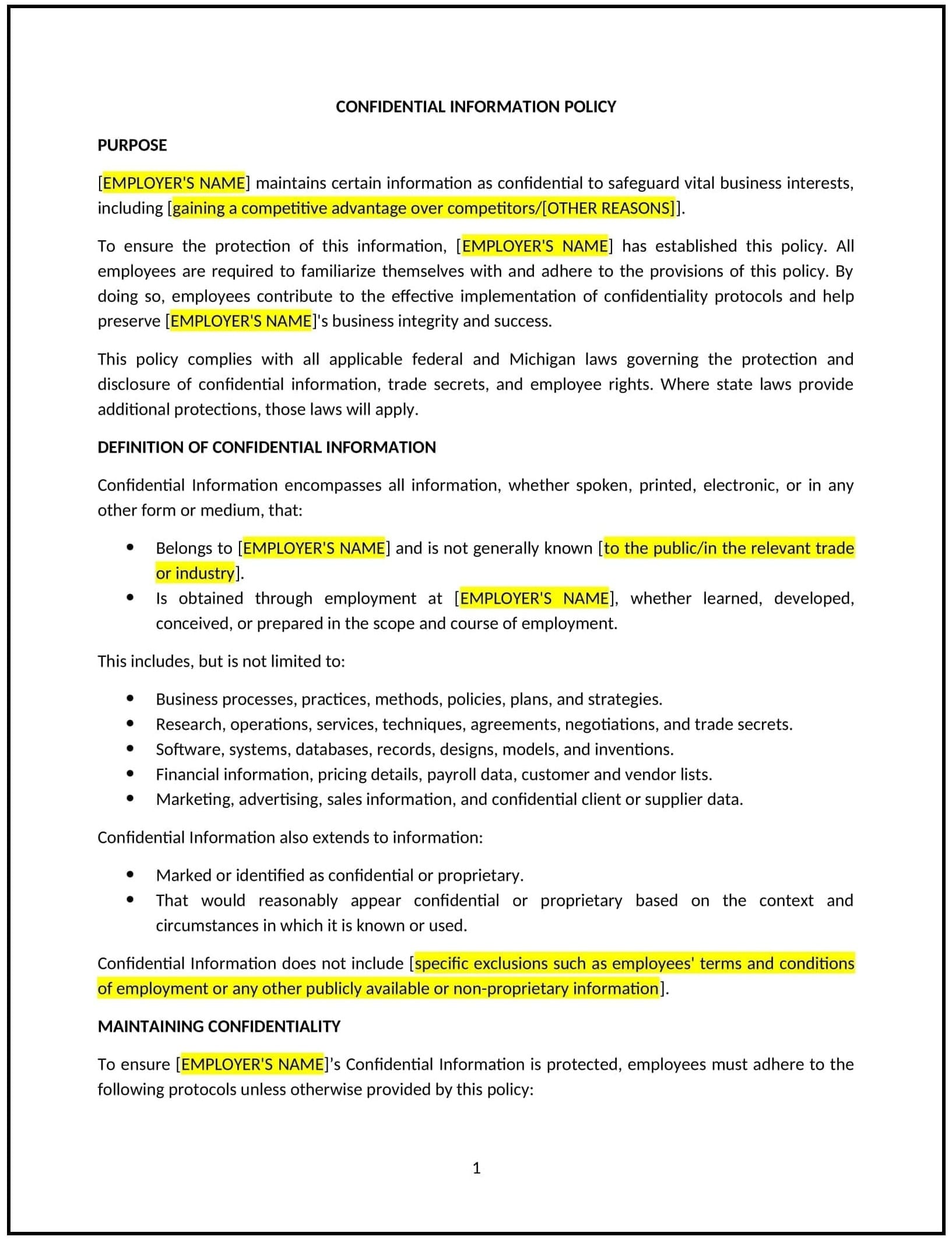Confidential information policy (Michigan): Free template
Got contracts to review? While you're here for policies, let Cobrief make contract review effortless—start your free review now.

Customize this template for free
Confidential information policy (Michigan)
A confidential information policy provides Michigan businesses with guidelines for handling sensitive and confidential information, ensuring that proprietary data, business strategies, and client information are protected from unauthorized disclosure or misuse. This policy establishes the expectations and procedures for safeguarding confidential information within the organization.
By adopting this policy, businesses can protect their intellectual property, ensure compliance with privacy regulations, and maintain trust with clients and employees.
How to use this confidential information policy (Michigan)
- Define confidential information: Clearly define what constitutes confidential information, including but not limited to business plans, customer data, financial records, employee information, trade secrets, and intellectual property.
- Set access restrictions: Specify who can access confidential information within the business and under what circumstances, ensuring that only authorized individuals handle sensitive data.
- Implement security measures: Outline the security protocols required to protect confidential information, such as encryption, password protection, secure file storage, and access control measures.
- Address third-party disclosures: Specify the circumstances under which confidential information may be disclosed to third parties, including the need for non-disclosure agreements (NDAs) or other legal protections.
- Establish reporting procedures: Set procedures for reporting suspected breaches of confidentiality, including who employees should contact and how reports should be made.
- Define employee responsibilities: Outline the specific responsibilities of employees to protect confidential information, both during and after their employment with the business.
- Specify consequences for violations: Clearly state the potential disciplinary actions for employees who violate the policy, including termination, legal action, or financial penalties.
Benefits of using this confidential information policy (Michigan)
This policy provides several key benefits for Michigan businesses:
- Protects sensitive information: Safeguards the business’s intellectual property, client data, and other confidential materials, reducing the risk of unauthorized access or misuse.
- Promotes trust: By protecting confidential information, businesses maintain trust with clients, partners, and employees, enhancing the organization’s reputation and reliability.
- Reduces legal risks: Establishes a clear framework for handling confidential data, minimizing the likelihood of legal disputes or breaches of privacy laws.
- Increases operational security: The policy helps prevent internal and external breaches, ensuring that sensitive information is only accessible to authorized personnel.
- Encourages employee accountability: Ensures that employees understand their role in protecting confidential information and the consequences of failing to comply with the policy.
Tips for using this confidential information policy (Michigan)
- Communicate the policy: Ensure that all employees are aware of the policy by including it in the employee handbook, during onboarding, and through regular training sessions.
- Provide regular training: Offer training to employees on how to handle confidential information securely and how to identify potential risks to data protection.
- Monitor compliance: Regularly audit and monitor the handling of confidential information within the business to ensure that security measures are being followed.
- Restrict access: Limit access to confidential information on a need-to-know basis, ensuring that only authorized personnel are able to view sensitive data.
- Review periodically: Update the policy regularly to reflect any changes in Michigan laws, data protection regulations, or business operations.